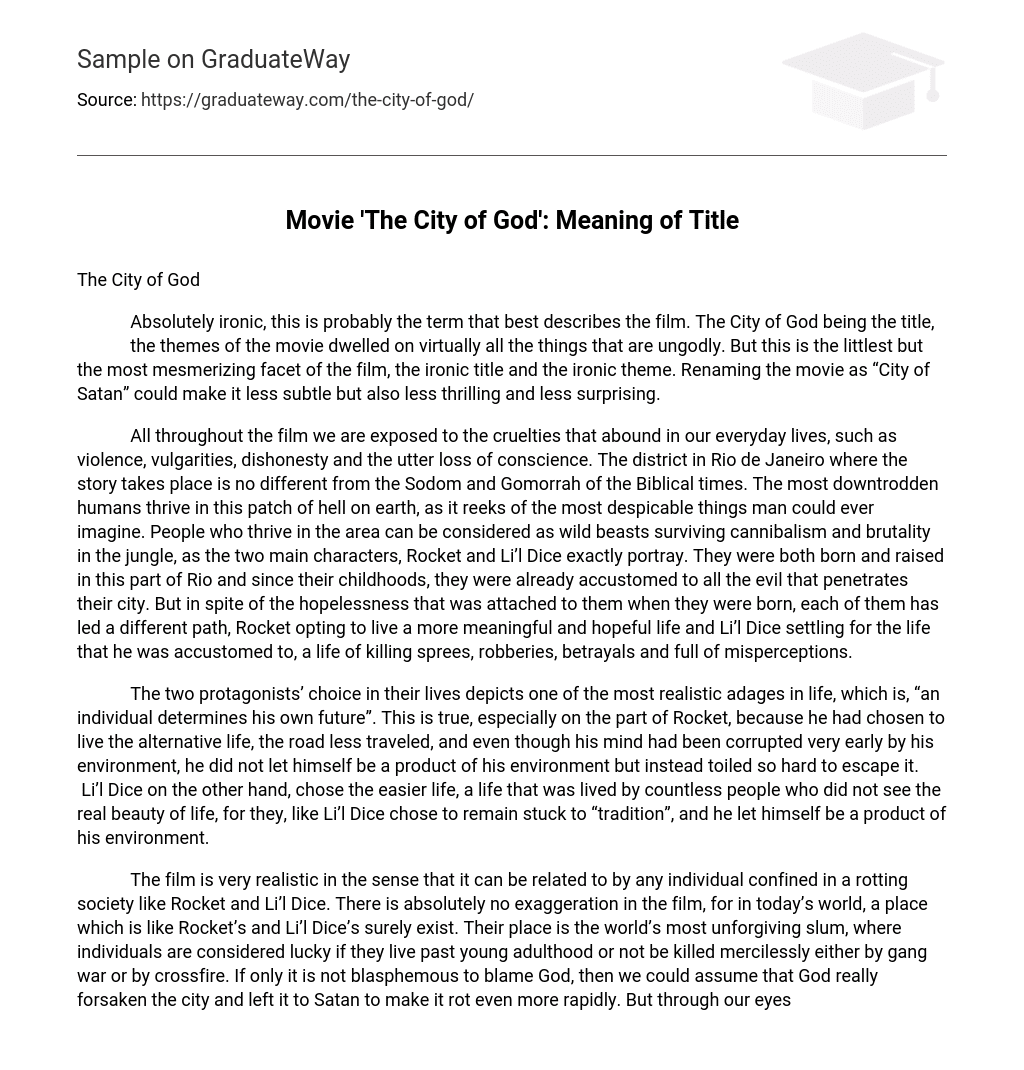The City of God
Absolutely ironic, this is probably the term that best describes the film. The City of God being the title, the themes of the movie dwelled on virtually all the things that are ungodly. But this is the littlest but the most mesmerizing facet of the film, the ironic title and the ironic theme. Renaming the movie as “City of Satan” could make it less subtle but also less thrilling and less surprising.
All throughout the film we are exposed to the cruelties that abound in our everyday lives, such as violence, vulgarities, dishonesty and the utter loss of conscience. The district in Rio de Janeiro where the story takes place is no different from the Sodom and Gomorrah of the Biblical times. The most downtrodden humans thrive in this patch of hell on earth, as it reeks of the most despicable things man could ever imagine. People who thrive in the area can be considered as wild beasts surviving cannibalism and brutality in the jungle, as the two main characters, Rocket and Li’l Dice exactly portray. They were both born and raised in this part of Rio and since their childhoods, they were already accustomed to all the evil that penetrates their city. But in spite of the hopelessness that was attached to them when they were born, each of them has led a different path, Rocket opting to live a more meaningful and hopeful life and Li’l Dice settling for the life that he was accustomed to, a life of killing sprees, robberies, betrayals and full of misperceptions.
The two protagonists’ choice in their lives depicts one of the most realistic adages in life, which is, “an individual determines his own future”. This is true, especially on the part of Rocket, because he had chosen to live the alternative life, the road less traveled, and even though his mind had been corrupted very early by his environment, he did not let himself be a product of his environment but instead toiled so hard to escape it. Li’l Dice on the other hand, chose the easier life, a life that was lived by countless people who did not see the real beauty of life, for they, like Li’l Dice chose to remain stuck to “tradition”, and he let himself be a product of his environment.
The film is very realistic in the sense that it can be related to by any individual confined in a rotting society like Rocket and Li’l Dice. There is absolutely no exaggeration in the film, for in today’s world, a place which is like Rocket’s and Li’l Dice’s surely exist. Their place is the world’s most unforgiving slum, where individuals are considered lucky if they live past young adulthood or not be killed mercilessly either by gang war or by crossfire. If only it is not blasphemous to blame God, then we could assume that God really forsaken the city and left it to Satan to make it rot even more rapidly. But through our eyes, God really has abandoned the city, for no individual in his right mind could endure the kind of life that either of the two protagonists lived – they live their lives one day at a time, for it takes them only one day only to hope that they would still be alive come the next sunrise.
No values exist in the “city”, for the only law implemented is the law of the universe – the law of survival. The city depicted the ills of the earth in its most extreme form, as people treat each other like hyenas jostling for position to be near a rotting carcass. But all of the dreadful things and perceptions that surround the city of God can be eradicated by Rocket, for he represents the sole light in a place darkened by unimaginable evil. Rocket serves as the embodiment of hopes and dreams, the aspirations of leaving hell in search for a heaven that only exists in dreams.
Works Cited:
“Cidade de Deus (2002).” 2000. Internet Movie Database Inc. 25 June 2007
<http://www.imdb.com/title/tt0317248/>.





